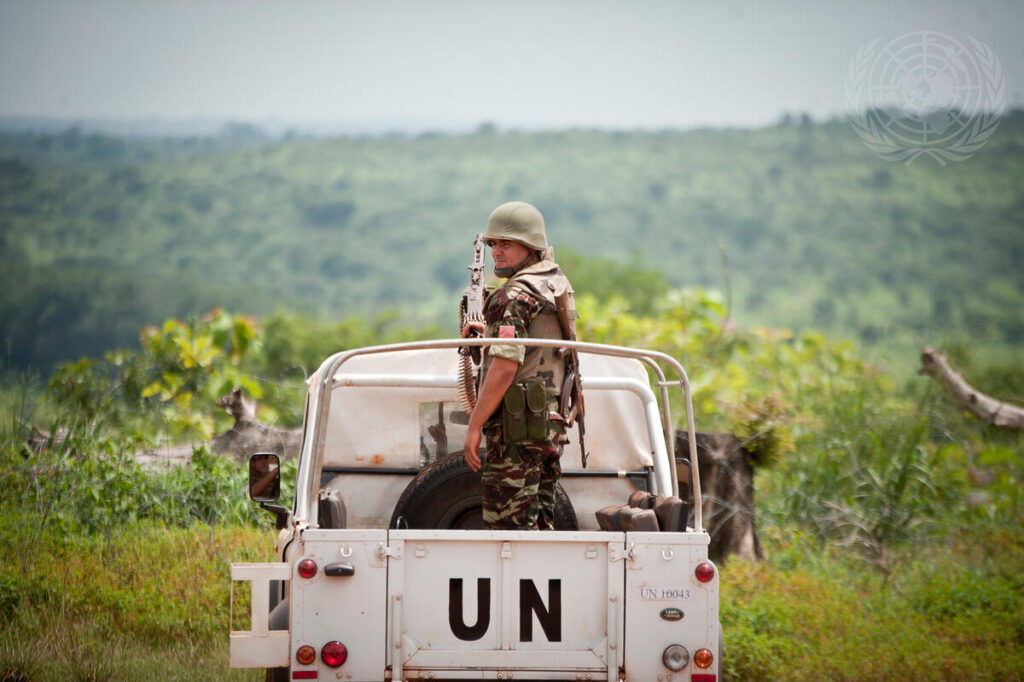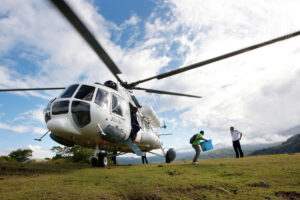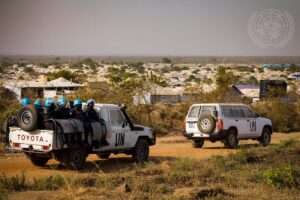Introduction
The UN Security Council is expected to renew the mandate of the United Nations Multidimensional Integrated Stabilization Mission in the Central African Republic (MINUSCA) by November 15, 2023. The upcoming council negotiations will unfold against the backdrop of several political developments, including a constitutional referendum and the further delay of local elections. While security dynamics in the Central African Republic (CAR) have improved, human rights violations and threats to the safety of civilians persist alongside underlying challenges of limited service provision, poor socioeconomic development, and significant humanitarian needs, all of which are exacerbated by regional conflict dynamics.
In this context, the International Peace Institute (IPI), Stimson Center, and Security Council Report co-hosted a roundtable discussion on October 12, 2023, to discuss MINUSCA’s mandate renewal. This roundtable offered a platform for member states, UN officials, civil society stakeholders, and independent experts to share their assessments of the situation in CAR in a frank and collaborative manner. The discussion was intended to help the Security Council make more informed decisions on prioritizing and sequencing MINUSCA’s mandate, as well as the mission’s strategic orientation and actions on the ground.1UN Security Council Resolution 2659 (November 14, 2022), UN Doc. S/RES/2659. This year’s workshop also introduced a section to critically reflect on the bigger picture the mission fits into, triggering discussions about the assumptions that underpin the current approach to the situation in CAR.
Participants largely agreed that MINUSCA’s mandated priorities remain relevant to the political and security context in CAR. Some called for a greater focus on supporting the CAR government by extending state authority, while others cautioned that all stabilization efforts should be clearly aligned with political solutions, emphasizing MINUSCA’s role in supporting political processes.
Participants raised several suggestions for the Security Council to consider as part of MINUSCA’s mandate renewal:
- Continuing support to the government’s implementation of the Political Agreement for Peace and Reconciliation (APPR) and the Luanda Joint Roadmap, including by maintaining momentum on disarming and demobilizing armed groups;
- Deepening cooperation and dialogue with national authorities and host populations to facilitate the mission’s operations, avoid misunderstandings, and communicate the mission’s achievements;
- Fostering engagement between national authorities, civil society actors, and local peace committees to facilitate an inclusive political process, particularly in the upcoming local elections; and
- Addressing misinformation, disinformation, and hate speech in collaboration with the host state and civil society.
Political Process
There have been improvements in CAR’s political process in late 2022 and the first half of 2023, with the disbanding of six armed groups and the announcement of a new calendar for local elections. However, tensions increased in August 2023 around the constitutional referendum, which removed presidential term limits and prevents dual nationals from running for office. The adoption of the new constitution has been criticized in the country and boycotted by opposition parties. Additionally, although the security situation has remained peaceful in Bangui, insecurity in outlying regions and the activities of foreign security forces remain threats. Armed groups have also increasingly been using improvised explosive devices (IEDs), which primarily harm civilians, and abducting civilians, including humanitarian workers and UN personnel.2Enrica Picco, “Ten Years after the Coup, Is the Central African Republic Facing Another Major Crisis?” International Crisis Group, March 22, 2023.
Participants emphasized that the momentum around the political process and the implementation of the Political Agreement for Peace and Reconciliation (APPR) and the Luanda Joint Roadmap agreement must be sustained, noting the essential nature of MINUSCA’s good offices both within the country and regionally. They also cited the reform of the justice system, the promotion of human rights, and the extension of state authority as key priorities. The support provided by regional actors, including the Economic Community of Central African States (ECCAS), the International Conference on the Great Lakes Region (ICGLR), the African Union (AU), and the European Union (EU), remains critical to the political and security context, including in supporting election preparations and navigating regional relations. While CAR’s relationship with Chad has improved recently, escalating conflict in Sudan and the Democratic Republic of the Congo (DRC) has ramifications for CAR, with increased humanitarian and security needs in border areas. The upcoming December 2023 elections in the DRC may also have security implications for CAR, requiring advance planning and communication with the UN peacekeeping mission in the DRC (MONUSCO).
Participants also noted progress on the disarmament and demobilization of ex-combatants under the APPR, particularly the dissolution of six armed groups and three other militias, all of which have signed the agreement.3UN Security Council, Central African Republic: Report of the Secretary-General, UN Doc. S/2023/442, June 15, 2023, para. 14. MINUSCA has played a role in providing technical assistance to these groups’ disarmament, demobilization, and reintegration (DDR). While other militias remain active, this represents important progress in the implementation of the APPR.
Local Engagement
Participants indicated a disconnect between the government’s strategic implementation of the APPR and its local-level implementation of the agreement and support for civil society initiatives. Some participants encouraged MINUSCA to strengthen its support to localizing implementation by increasing the mission’s engagement with civil society and local peace committees. These efforts could enhance community ownership over the agreement and help restore the trust of the population in the political process, as well as improve responses to region-specific conflict drivers. Participants thus encouraged MINUSCA to expand and improve its engagement with civil society while also recognizing the political divisions within civil society. Given the different conflict drivers in each region of CAR, participants called for local solutions that enable a tailored and region-specific approach and coordination across the different parts of the country.
Additionally, participants noted the importance of consolidating MINUSCA’s support to the Central African authorities in organizing local elections, which are now scheduled to occur in two rounds on October 13, 2024, and January 26, 2025. Some participants expressed a desire to see MINUSCA provide greater support to local populations, including women and youth, in actively engaging and participating in elections. Participants also called for the mission to continue to foster civic space and strengthen the protection of human rights. While human rights violations remain widespread, participants noted the government’s promising adoption of a new national human rights policy, developed in collaboration with MINUSCA. One participant emphasized that MINUSCA’s human rights mechanisms could play a greater role in relaying the abundant information on human rights violations in the field to the Security Council to further enrich policymakers’ understanding of the situation on the ground.
Stabilization and Extension of State Authority
The security situation in CAR remains volatile given the fighting between armed groups that have not signed the APPR, particularly those belonging to the main rebel coalition (the Coalition of Patriots for Change, or CPC), and the Central African armed forces (FACA). However, there have been some improvements following the return of state authority to the town of Sam Ouandja after several years of control by rebel groups, the dissolution of some armed groups and militias, and MINUSCA’s ongoing capacity building and operational support to the FACA.4Ibid., para. 8. MINUSCA notably supported CAR’s Ministry of Defense in finalizing a national defense policy, which provides a framework for the establishment of a garrison army in six defense areas.5Ibid., para. 48. The FACA’s limited resources and capacity, however, continue to impede the effectiveness of joint patrols with the mission to protect civilians, which one participant emphasized as a priority for the host state.
Several participants thus recommended that MINUSCA further prioritize capacity building and other forms of assistance to the FACA. The host state wants the mission’s support in developing a military strategy on the extension of state authority and restoration of peace to strengthen the FACA’s effectiveness and support stronger engagement with the mission. Others emphasized, however, that further support to the host state would require additional resources. Participants also flagged demining support and training by the UN Mine Action Service (UNMAS) as important for the FACA. One participant also brought up lifting the arms embargo to allow the government to reform its security sector and enable the FACA to defend territories from armed groups.
Alongside recent territorial gains, the government has deployed more administrative authorities and civil servants across the country, with 82 percent of local authorities deployed as of June 2023.6Ibid., para. 45. Participants considered how MINUSCA can best support stabilization efforts following these recent gains. They acknowledged that while the restoration of state authority is critical for the protection of civilians, some local actors may perceive it as an imposition. To address this challenge, participants stressed the importance of decentralizing state authority to local governance institutions to strengthen institutional capacity and enhance the provision of security and services to remote areas. They also emphasized the importance of the fight against impunity and the provision of socioeconomic support to local communities to ensure they receive and sustain peace dividends.
One participant noted that the focus on stabilization and extension of state authority may leave little incentive for long-term political solutions. Politics tend to be overshadowed by security priorities, which further erodes state legitimacy, shrinks civic space, and limits support and linkages to local peace committees. Further, when the state lacks the capacity, presence, and legitimacy to extend its authority, the expectation is for the mission to lead, leading the UN to be blamed for any shortcomings that may arise.
Partnerships
Participants noted that peacekeeping should be considered a temporary political tool that needs to be accompanied by investment in areas outside of a mission’s mandate. Investment in development, employment, infrastructure, and longer-term state-building are critical to alleviating poverty and addressing the underlying socioeconomic challenges to peace.
Participants acknowledged that MINUSCA’s mobility, agility, and capacity to deliver on its mandate highly depend on the country’s internal infrastructure. Improving infrastructure such as roads and bridges would also promote economic development by extending basic public services and facilitating activities that generate revenue. Participants also underlined the importance of providing livelihood and employment opportunities to former combatants, particularly youth.
Strategic Communications
Disinformation, now widespread both offline and online in CAR, was widely discussed. In addition to reducing trust in the mission and threatening the safety and security of peacekeepers, disinformation and hate speech can undermine social cohesion and promote violence. MINUSCA has used its strategic communications capacity, including UN radio, and human rights reporting to monitor and mitigate harmful information. Participants emphasized that such efforts need to go beyond calling out individual falsehoods and should be integrated into the programmatic work of the mission to achieve more tangible results. They also raised the importance of cooperating with the Ministry of Communication and Media and the High Communication Council to address disinformation and hate speech, including through joint communications.
Several participants recommended that MINUSCA look beyond disinformation against the mission itself to consider the impact of disinformation on the conflict context more broadly, including on civil society. Dissenting voices and activists have been deliberately targeted for harassment and incitement to violence to limit their activities and undermine civic space. Civil society also has a crucial role to play in fighting disinformation but requires more tools and training.
Relationship with the Host State
Participants noted that the relationship between the host state and MINUSCA has continued to improve through the mission’s continuous and consistent communication with Central African authorities. However, expectations for the mission remain high, and some of the mission’s successes are not easily visible to national authorities, who tend not to be present in the areas where the mission operates. Participants thus encouraged national authorities to visit MINUSCA’s key areas of operation to assess the dynamics on the ground and verify and analyze the tangible results of the mission’s efforts. One participant also noted that the length and detail of the mandate raises expectations of what the mission can deliver and makes it more difficult for the mission to clearly communicate the mandate to the host government and populations.
One participant reiterated the national authorities’ call for an independent evaluation of MINUSCA to assess what it has achieved so far in the implementation of its mandate. Participants highlighted that the upcoming ten-year anniversary of MINUSCA’s deployment is an opportune moment to reflect on achievements and lessons from the past decade.
Conclusion
Workshop participants agreed that MINUSCA’s mandate is sufficiently robust and broad. While a comprehensive mandate can be an opportunity to provide a wide range of support, this support becomes challenging to deliver if the mission lacks the requisite resources, equipment, and personnel. Moreover, effective implementation requires clear and consistent communication with the host state and populations on the mission’s objectives, end vision, and progress to date. It is therefore critical for MINUSCA to continue deepening its cooperation with national and local authorities.
While there was a consensus that the mandate remains fit for purpose, participants highlighted the importance of streamlining language and prioritizing the protection of civilians, the use of good offices to support the political and peace processes, facilitation of humanitarian assistance, support to local elections, and DDR. There was also a strong emphasis on the need to prioritize the extension of state authority in MINUSCA’s mandate.
Get the full article PDF on International Peace Institute (IPI)
Header photo: A MINUSCA peacekeeper escorts a UN delegation in Bambari, northeast of Bangui. Credit: UN Photo/Catianne Tijerina.
Notes
- 1UN Security Council Resolution 2659 (November 14, 2022), UN Doc. S/RES/2659.
- 2Enrica Picco, “Ten Years after the Coup, Is the Central African Republic Facing Another Major Crisis?” International Crisis Group, March 22, 2023.
- 3UN Security Council, Central African Republic: Report of the Secretary-General, UN Doc. S/2023/442, June 15, 2023, para. 14.
- 4Ibid., para. 8.
- 5Ibid., para. 48.
- 6Ibid., para. 45.




